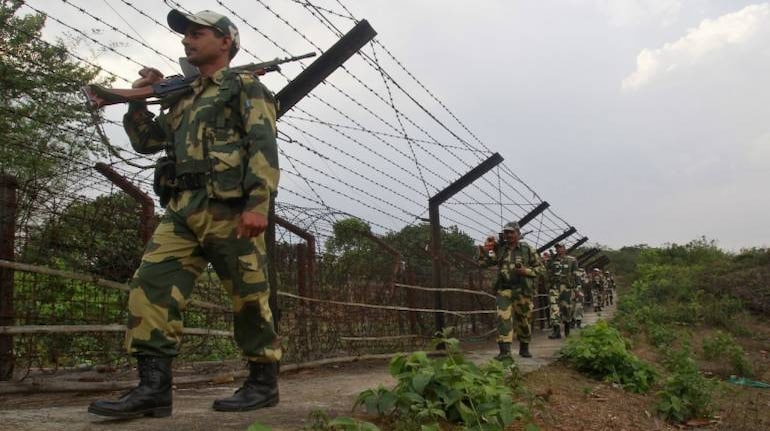



A new day, and a new battle for federal stakes. The latest battle of attrition between the central government and non-BJP ruled states has come in the form of an enhanced role for the Border Security Force (BSF) on India’s international borders.
In October 2021, the Ministry of Home Affairs (MHA) had enhanced the powers of the BSF to `arrest, search, and seize’ within 50 km from the international boundary in Assam, West Bengal and Punjab.
Such operational powers of the BSF, a central armed police force under the Union, would also be applicable to the newly-created Union Territory of Jammu and Kashmir, and Ladakh.
As per the current arrangement, the BSF writ in Gujarat ran up to a depth of 80 km and in Rajasthan up to 50 km. In Punjab, Assam and West Bengal, the central force's jurisdiction was up to a depth of 15 km only.
The MHA’s latest notification seeks to reinforce the capabilities of the state police in securing the states under section 139 of the BSF Act, which empowers the force to discharge certain powers and duties within local limits of the areas specified in the schedule.
BSF director general Pankaj Kumar Singh told the media that demographic changes in certain border districts of Assam and West Bengal was one of the reasons for enhancing the jurisdiction of the border guarding force.
'Attack on federalism'However, nothing is ever as easy as it may appear. Two states-–both notably non-BJP--West Bengal and Punjab, have let out howls of protest saying that the move was an attack on federalism.
The government demurred. The minister of state for home, Nityanand Rai, told Parliament that the “Government of West Bengal and Government of Punjab have expressed their apprehension that such a move encroaches upon the powers of the state government. Their apprehensions are ill-founded. The extension of territorial jurisdiction of BSF would result in better and more effective control on trans-border crimes in conjunction and co-operation with state police.”
Veterans such as Prakash Singh, a former BSF chief, believe that since national security is at stake, the political storm over extension of its jurisdiction is uncalled for.
``Assam, West Bengal and Punjab have international borders. The threat perception from across the international borders has undergone a sea change in the context of recent developments in the Af-Pak region. Radical groups of different shades are feeling emboldened and are going to make a determined attempt to destabilise Punjab, where there have been several attempts to drop weapons from drones,” he told Moneycontrol.
Clearly, it is a case of differing perceptions. The last notification of the MHA issued in July 2014 defining the jurisdiction of the BSF, stated that the force could operate without restrictions in Nagaland, Manipur, Mizoram, Tripura and Meghalaya.
Under the latest notification, nothing changes in the North East and Rajasthan. In Gujarat, the jurisdiction has been reduced from 80 km to 50 km. The controversial step is in Assam, West Bengal, and Punjab, where the BSF jurisdiction has been extended from 15 km to 50 km. It is this part of the notification which has raised political hackles in Punjab and West Bengal.
The recent troubles in the North East after the slaying of Colonel Viplav Tripathi and his family has heightened fears of more trouble in a region, which were considered sanitised till recently.
Both Bengal and Assam have been wracked by alleged illegal migration, ethnic insurgencies, smuggling, counterfeit currency, and drug trafficking-–now add to it drones.
Updating for new reality?The former head of the Territorial Army, Maj Gen Ashwani Siwach told Moneycontrol: ``It is only an increase in the jurisdiction of the BSF, who now must also contend with drones flying up to 50 km inside Indian territory, which means that a 15 km jurisdiction becomes practically redundant. This is a welcome move by the government.”
Officials point out that the jurisdiction of state police forces has neither been curtailed nor its powers reduced. It is just that the BSF will also be exercising powers of search, seizure and arrest in respect of only the Passport Act 1967, Passport (Entry into India) Act 1920 and specified sections of the Criminal Procedure code — in other words against those entering India illegally.
It is merely an “enabling provision aimed at strengthening and complementing the efforts of the state police”, says Prakash Singh, who adds that the BSF would, in any case, be handing over the accused to the local police.
Interestingly in 2011, the Congress-led UPA had brought a bill to vest the BSF with powers to search, seize and arrest in any part of the country where it was deployed. It had to be dropped in the face of concerted opposition to the proposed measure.
The Indian Constitution is without doubt a federation–-but one which leans towards a strong Centre, noted British constitutionalist, Sir Ivor Jennings, once famously observed.
In India, where police and public order are the responsibility of states, “the Union may devise emergency regimes in its Constitution through legislation to override the exclusive autonomy of the states in respect of law and order and policy”. This latest move on the BSF by the Modi government is an archetypal example of this unique arrangement.
Discover the latest Business News, Sensex, and Nifty updates. Obtain Personal Finance insights, tax queries, and expert opinions on Moneycontrol or download the Moneycontrol App to stay updated!
Find the best of Al News in one place, specially curated for you every weekend.
Stay on top of the latest tech trends and biggest startup news.